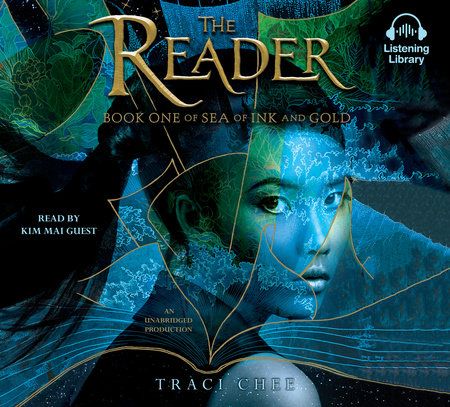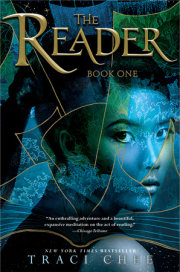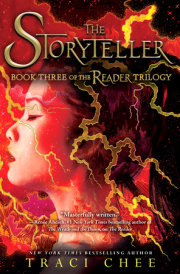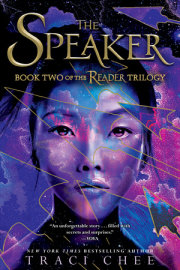Chapter 1 The Consequences of Thievery There were redcoats on the road. The gravel path that cut through the tangled jungle was teeming with people, and the mounted Oxscinian soldiers rode above the sea of foot traffic like lords in a parade: their fine red jackets unblemished, their black boots polished to a high shine. At their waists, their sword hilts and gun grips glinted in the gray morning light.
Any law-abiding citizen would have been happy to see them.
“No good.” Nin grunted, shifting the pile of furs in her arms. “No good at all. Thought this town would be small enough for us to escape notice, but that doesn’t seem likely now.”
Crouched in the undergrowth beside her, Sefia surveyed the other shoppers, who carried baskets or towed rattling carts with burlap nests for their infants, the parents calling sharply after dirt-smudged children if they wandered too far. In their trail-worn gear, Sefia and Nin would have blended in well enough, if not for the redcoats.
“Are they here for us?” Sefia asked. “I didn’t think the news would spread so fast.”
“Word travels quick when you’ve got a face as pretty as mine, girl.”
Sefia forced out a chuckle. Old enough to be her grandmother, Nin was a squat woman with matted hair and a face as tough as rawhide. Being pretty wasn’t what made her memorable.
No, Nin was a master criminal with hands like magic. They were nothing special to look at, but she could slip a bracelet from a woman’s wrist with a touch as soft as a breath. She could undo locks with a twitch of her fingers. You had to see Nin’s hands at work to really see her at all. Otherwise, in her bear-skin traveling cloak, she looked something like a hill of dirt: dry, brown, ready to crumble in the humidity of the rain forest.
Ever since they’d fled their home in Deliene, the northernmost of Kelanna’s five island kingdoms, they’d kept a low profile as they roamed from one land to the next, surviving on what they could find in the wilderness. But in the hardest winters, when the scavenging was poor and the hunting was worse, Nin had taught Sefia to pick locks, pick pockets, and even steal huge hocks of meat without anyone noticing.
And for six years, they hadn’t been caught.
“Can’t stay here.” Nin sighed and hefted the pelts in her arms. “We’ll unload these in the next town.”
Sefia felt a twinge of guilt in her stomach. It was her fault, after all. If she hadn’t been so cocky two weeks ago, no one would have noticed them. But she’d been stupid. Overconfident. She’d tried to steal a new bandanna for herself—all viridian with gold paisley, much finer than her faded red one—but the clothier had noticed. At the last second, Nin had slipped the bandanna into her own pocket, taking the blame so Sefia wouldn’t have to, and they’d left town with redcoats on their heels.
It had been too close. Someone might have recognized Nin.
And now they had to leave Oxscini, the Forest Kingdom that had been their home for over a year.
“Why don’t I do it?” Sefia asked, helping Nin to her feet.
Nin scowled up at her. “Too dangerous.”
Sefia plucked at the topmost pelt in Nin’s arms. Half of these were kills she’d brought down and skinned herself, enough to help them pay for passage out of Oxscini, if they ever got into town to trade them. Nin had kept them safe all these years. Now it was Sefia’s turn.
“It might be more dangerous to wait,” she said.
Nin’s face clouded. Though the old woman had never explained exactly how she’d met Sefia’s parents, Sefia knew it was because someone had been after them. They’d had something their enemies wanted.
And now Sefia had it.
For the past six years, she’d carried everything she owned on her back: all the tools she needed to hunt and cook and camp, and at the bottom, slowly wearing holes in the leather, the only thing she had left of her parents—a heavy reminder that they had existed, and now were gone. Her hands tightened on the straps of her pack.
Nin shifted her weight and glanced over her shoulder, into the thick of the jungle. “I don’t like it,” she said. “You’ve never gone in alone.”
“You
can’t go in.”
“We can wait. There’s a village a five-day journey from here. Smaller. Safer.”
“Safer for you. No one knows who I am.” Sefia lifted her chin. “I can go into town, sell off the goods, and get out of there by noon. We’ll be twice as fast if we don’t have these pelts to lug around.”
Nin hesitated for a long moment, her shrewd gaze darting from the shadows in the undergrowth to the flashes of red on the road. Finally, she shook her head. “Be quick,” she said. “Don’t hold out for the best price. All we need is enough to hop a ship out of Oxscini. Doesn’t matter where.”
Sefia grinned. It wasn’t every day she won an argument with Nin. She wrested the heavy stack of pelts from Nin’s sturdy arms. “Don’t worry,” she said.
Frowning, Nin tugged on the red bandanna Sefia used to tie her hair back. “Worry’s what keeps us safe, girl.”
“I’ll be fine.”
“Oh, you’ll be fine, will you? Sixty years of this life, and I’m fine. Why is that?”
Sefia rolled her eyes. “Because you’re careful.”
Nin nodded once and crossed her arms. She looked so perfectly like her grouchy old self that Sefia smiled again and gave her a quick peck on the cheek. “Thanks, Aunt Nin,” she said. “I won’t let you down this time.”
The woman grimaced, wiping her face with the back of her hand. “I know you won’t. Sell the furs and come straight back to camp. There’s a storm brewing, and I want to get going before it breaks.”
“Yes, ma’am. I won’t let you down.” Turning away, Sefia glanced up, noting the moisture in the air, the speed of the clouds as they crossed the sky. Nin always knew when the rains were coming, said it was the chill in her bones.
Sefia stumbled off, hefting the furs in her slender arms. She was almost at the edge of the trees when Nin’s gruff voice reached her again, quick with warning: “And don’t you forget, girl. There’s worse than redcoats out there.”
She didn’t look back as she struck out from under cover to join the other people on the road, but Sefia couldn’t stop herself from shuddering at Nin’s words. They had to avoid the authorities because of Nin’s reputation for thievery, but that wasn’t the reason they lived like nomads.
She didn’t know much, but over the years she’d gathered this: Her parents had been on the run. They’d done all they could to keep her isolated, safe from some nameless, faceless enemy.
It hadn’t been enough.
And now the only thing that kept her safe was her mobility, her anonymity. If no one knew where she was or what she carried, no one would find her.
Sefia shrugged her pack higher on her shoulders, feeling the weight thump against the small of her back, and weaved seamlessly into the crowd.
By the time she reached the edge of town, Sefia’s arms were aching with the weight of the furs. She tottered past the docks, where a few small fishing boats and merchant ships were moored to the tipsy piers. Beyond the cove, the crimson hulks of Oxscinian Royal Navy ships lay at anchor, decks spiked with cannons.
Five years ago, a handful of patrol boats would have sufficed, but now they were at war with Everica, the recently united Stone Kingdom, and they’d tightened the restrictions on trade and travel. Sefia and Nin could no longer get to the embattled shores of Everica, and even the stretch of Central Sea between the two kingdoms was rife with at-sea skirmishes and bloodthirsty privateers. To ordinary citizens, the sentinel ships might have been protectors, but to Sefia, who had never been ordinary, they were prison guards, barring her escape.
At the entrance to the town square, she paused to study the layout of the market, searching for alleys she might use if she needed a quick exit. Around the perimeter were rows of shops easily identified by the crests over their doors: a cleaver and a pig for the butcher, an anvil for the blacksmith, crossed wooden peels for the baker. But it was the cluster of covered stalls in the center of the square that drew the crowds. On market days, traveling merchants and local farmers came from miles around, selling everything from bolts of cloth to scented soaps and balls of twine.
Sefia wove among vendors hawking mangoes and passion fruit, sacks of coffee and catches of silver fish. Through the throngs of shoppers, she spied loose clasps on bracelets and jackets bulging with coin purses, but now was not the time for thievery.
She passed the newsstand, where a member of the newsmen’s guild, a woman in a short-billed newsman’s cap and brown armbands, greeted her with more news of the turmoil abroad: “Another merchant ship lost to Captain Serakeen off the Liccarine coast! Queen orders additional naval escort for ambassadors traveling to Liccaro!” At her feet, the collection tin rang with the
plink! plink! of copper coins.
Sefia shuddered. While Everica and Oxscini warred in the south, the sweltering desert kingdom of Liccaro had problems of its own: Serakeen, the Scourge of the East, and his fleet of brutal pirates. He terrorized the seas around the poor island, pillaging coastal cities and extorting others, attacking traders and supply ships bringing aid to a kingdom that hadn’t had a king in generations. She and Nin had barely escaped one of Serakeen’s warships when they’d left Liccaro over a year ago. She still remembered the bursts of fire from distant cannons, the explosions of water on either side of the ship.
As she made for the furrier’s stall, elbowing her way past people dressed in work shirts and old trousers, long cotton dresses and pointed coattails, a flash of gold caught her eye: a light no bigger than a puddle, rippling beneath the boot heels of the crowd. She smiled. If she looked too closely, it would disappear, so she contented herself with knowing it was there, on the edge of her vision.
Her mother had always told her there was some hidden energy to the world, some
light simmering just beneath the surface. It was always there, swirling invisibly around her, and every so often it would bubble up, as water appears from a fissure in the earth, a golden glow visible only to those who were especially attuned to it.
Like her mother. Her beautiful mother, whose copper skin would tan to bronze in the summer months, who had given her the same slender build, the same unusual grace, the same special sense that there was more to the world than its physical forms.
When Sefia had brought it up with Nin, her aunt had gone sullen and silent, refusing to answer any questions or even make casual conversation for a whole day.
She’d never mentioned it again, though that didn’t stop her from seeing it.
As the little pool of light began to ebb away, a man crossed in front of her. Stiff black hair flecked with gray, a stoop accentuated by an oversize sweater. She looked again.
But it wasn’t him. The shape of his skull was wrong. The height was wrong. He didn’t share her straight brows or her teardrop eyes, dark as onyx. Everything was wrong. It was
never him.
Her father had been dead for six years, her mother for ten, but that didn’t stop her from seeing them in complete strangers. That didn’t stop the ache in her heart when she remembered, again, that they were gone.
She shook her head and blinked rapidly as she approached the furrier’s, where a harried-looking woman was pawing through chinchilla furs with one hand while gripping the arm of her young son with the other. The little boy was crying, her hold on him so tight her fingers puckered his pink skin.
“Don’t you ever leave my sight again! The impressors will get you!” When she shook his arm, his entire body wobbled.
The furrier, a plain woman with spindly arms, leaned over the counter, digging her hands into a stack of fox pelts. “I heard another boy disappeared this week, just down the coast,” she whispered, glancing sideways to see if anyone was eavesdropping. Half-hidden behind her armful of pelts, Sefia pretended to take a greater interest in the paper envelopes of goods in the next stall, each one painted with a picture of the spices inside: cumin, coriander, fennel, turmeric . . .
“See?” The mother’s voice rose in pitch. “This is impressor country!”
Sefia’s pulse quickened.
Impressors. Even the word sounded sinister. She and Nin had been overhearing bits of news about them for a couple of years now. As the story went, boys were disappearing all over Kelanna’s island kingdoms, too many to be runaways. There was talk of boys being turned into killers. You’d know them if you saw them, people said, because they’d have a burn around their neck like a collar. That was the first thing impressors did—brand the boys with red-hot tongs so they’d have that exact scar.
The thought of the impressors made Sefia hunch her shoulders, suddenly conscious of how exposed she was in this sea of strangers, these watchers and whisperers. Checking behind her, she caught sight of a flash of crimson among the stalls. Redcoats. They were headed her way.
As soon as the woman and her son left, Sefia dumped Nin’s pelts on the counter. While the furrier thumbed through them, Sefia fidgeted impatiently, glancing around at the swirling crowd, reaching behind her every so often to reassure herself that the mysterious angular object remained inside her pack.
Someone tapped her on the shoulder. Stiffening, Sefia turned around.
Behind her were the redcoats.
“Have you seen this woman?” one asked.
The other held out a yellowed sheet of paper, curling at the edges. A fading sketch. The features of the wanted woman were hooded and indistinct, but there was no mistaking the slope of her shoulders, the matted bear-skin cloak.
Sefia felt as if she’d been dropped into dark water. “No,” she said faintly, “who is it?”
The first redcoat shrugged and moved to the spices stall. “Have you seen this woman?”
The other smiled sheepishly. “You’re too young to remember her, but thirty years ago she was the most notorious thief in the Five Islands. They called her the Locksmith. Someone a few towns over said they spotted her, but who knows. She’s probably long dead by now. Don’t you worry.”
Swallowing, Sefia nodded. She recognized the story. The redcoats passed into the crowd again.
The Locksmith.
Nin’s old moniker.
She agreed to the first price the furrier offered her and dumped the gold coins into her purse beside a piece of rutilated quartz and the last few rubies from a necklace she’d stolen in Liccaro. Was it enough? It had to be enough.
Stowing her purse, she brushed the bottom of her pack once more and plowed into the crowd, elbowing the other shoppers aside in her haste to leave town.
Once she reached the jungle, she began to run, breaking brush, catching on branches, made awkward and slow by the weight of her pack.
Was that crashing in the foliage the sound of her own passage, or the sounds of a chase?
She stole a glance behind her, imagining the creak of leather boots, the pounding of feet.
She ran faster, the hard rectangular object beating painfully against the base of her spine. The woods grew hot and humid around her.
Word travels quick. She had to get Nin. If the redcoats knew Nin was in Oxscini, there was no telling who else knew too.
The campsite was only twenty yards ahead when, without warning, the forest around her went silent. The birds stopped singing. The insects stopped buzzing. Even the wind stopped whispering. Sefia froze, all her senses alert, her breath sounding loud as a lumber saw in the unmoving undergrowth. Her skin crawled.
Then came the smell. Not the foul, rotting smell of sewage but a too-clean smell, like copper. A smell she could taste. A smell she could feel tingling in the tips of her fingers.
A smell she knew.
Through the trees, she heard Nin’s voice, low and guarded, the same voice she used when she was facing down large game, all claws and tusks, ready to charge: “So. You finally found me.”
Chapter 2 Worse Than Redcoats Sefia ducked into the nearest patch of ferns, trembling so violently the fronds began quivering at her touch. The stench of scorched earth and copper was so strong her insides hummed with it.
There was the sound of laughter, like ground glass. “I almost didn’t believe it when we got word some redcoats nearly caught you in the Oxscinian backwoods, but here you are.”
We. Sefia dug her fingers into the dirt. Her suspicions had been right. Someone—a group of someones—
had been searching for them. And found them.
Because of her.
She began pulling herself along the ground. Spiderwebs caught in her hair. Thorns pricked her skin. She gritted her teeth and kept going, inching closer and closer to the campsite.
“I’ve spent my whole apprenticeship hunting you. I wasn’t even sure you were as uncatchable as everyone said you were—”
“Get on with it, will you?” Nin interrupted.
A quick, muffled snap made Sefia pause, eyes wide, in the brush. But through the huge, shovel-shaped leaves she could see nothing.
“. . . or if you were dead.”
After a moment, Nin grunted, “Still kicking.”
“For now.”
No. Sefia dragged herself through the brush.
Not again. Ignoring the spines of an overgrown rattan, she wedged herself up against a rotting log shrouded with moss and air plants. Branches caught at her clothing, but through the spiked leaves and dead vines, she could almost see what was happening in the clearing.
Nin was on her knees, gingerly touching the side of her head. A trickle of blood ran down the heel of her hand and dropped from her wrist.
A hooded woman stood over her. Clothed all in black, the woman was like a shadow come striding out of the forest, all violence and darkness. At her side, her right hand rested on the hilt of a curved sword.
Past the screen of leaves, Sefia could just make out the forms of two black horses tied among the trees. Two horses. There was someone else in the clearing.
“Search her,” came a man’s voice, dry and brittle as bones.
Sefia shuddered at the sound of it.
The woman in black knelt in front of Nin’s pack and upended its contents onto the forest floor. The pots and knives, the tent and hatchet, the collapsible brass spyglass, all of Nin’s belongings came clattering out in a burst of noise. Sefia started. Rattan spines raked her cheek, drawing blood.
She barely noticed. A cold rivulet of fear ran down her spine. Sefia could see the woman clearly now. Her enemy had a face: ugly dishwater eyes and cratered skin, with a few limp locks of hair floating around her cheeks.
Was this the same person who had killed her father?
“It’s not here,” Nin said.
It. Sefia’s hand went to her pack. Through the leather, the hard metal corners of the strange object dug into her palm. This
was what they wanted.
The woman went rooting among Nin’s things, tossing aside the patched shirts and hand-carved utensils with a carelessness that made Sefia’s insides burn.
At last the woman in black straightened. The stink of metal grew sharper. It crackled and burned, until the air was buzzing with it.
She whirled on Nin. “Where is it?”
Nin glared up at her, bent forward, and spat in the dirt.
The woman struck her across the face with the back of her hand. In the bushes, Sefia bit down on her tongue to keep from crying out. Nin’s lip split. Blood pooled between her teeth.
Sticking out her chin, Nin leaned over and spat again. “Gonna take more than that to make me talk,” she said.
The woman in black let out a bark of laughter. “You’ll talk. By the time we’re done with you, you’ll
sing. You saw what we did to him, didn’t you?”
Her father. Sefia fought back the memory of amputated limbs. Misshapen hands. Things no kid should see. Things no one should ever see.
Nin hadn’t seen the body. She’d spirited Sefia away into the woods as soon as she’d shown up, sobbing and bedraggled, at Nin’s door.
But Sefia had seen it.
She knew what they could do.
Nin said nothing.
Beyond Sefia’s vision, the man spoke again, his words like ice: “Let’s go. It’s not here.”
“I already told you that,” Nin grumbled. “For folks who’re supposed to be so powerful, you aren’t too bright, are you? No wonder it took you so long to track me down.”
“You think that matters? You think that’ll stop us?” The woman in black hit her again. “We are the wheel that drives the firmament. We’ll
never stop.”
And again, her fist making wet smacking sounds against Nin’s wrinkled flesh.
Sefia flinched. A branch snapped beneath her. She tensed.
The rhythm of the woman’s blows didn’t falter, but across the clearing Nin froze. For a second, her eyes locked with Sefia’s, warning her to stay put. To keep quiet.
Nin crumpled at the next impact. Her face in the dirt, her flesh swollen and cut.
Stop them, Sefia told herself. She could go out there and give up her pack. Just give them what they wanted.
But fear roiled inside her.
A dismembered corpse. The sick stench of metal.
She’d seen what had happened to her father.
There was movement to her right. Sounds of footsteps in the dead leaves. Sefia went cold. The man was coming for her, stalking the underbrush like a predator. She still couldn’t see him, but the tips of the ferns bent and tilted at his passage, sending ripples among the fiddleheads. He was getting closer.
The smell of metal was so sharp it made her teeth hurt.
“Wait,” Nin coughed.
The man halted.
The woman in black paused, her arm drawn back.
Slowly, Nin pushed herself off the ground. Blood and saliva dribbled from her chin. She wiped it away, squinting up through her bruises. “If you want to do any real damage, you’ve got to get my good side,” she said, tapping her other cheek.
The woman in black seized Nin’s hand and twisted.
Nin buckled.
Her wrist snapped.
Sefia nearly lunged out from the brush to get to her, but Nin was watching her again.
Stay put. Keep quiet. “Enough,” the man said.
The woman in black glared in his direction, but she grabbed the collar of Nin’s cloak, hauling her to her feet. The horses were stamping and whiffling at the edge of the clearing.
Now, Sefia thought.
Before it’s too late. But she couldn’t move. She couldn’t.
They bound Nin’s hands and mounted, Nin letting out a slight
whuff of air as they forced her up. Despite the thorns that caught on her hands and arms, Sefia pushed away the barbed leaves until she could see Nin’s swollen eyes watching her from the back of the horse.
Nin.
The only family she had left.
Then they were gone, slipping away between the branches, which closed behind them as if they’d never been.
As the sound of the horses faded into the distance, the copper smell dissipated like mist, leaving that familiar metallic taste in the back of Sefia’s throat.
Her breath came in ragged gasps. Hoisting herself over the log, she staggered into the clearing, where she fell forward among Nin’s belongings. The sobs came suddenly up from her stomach, wracking her entire body.
Six years on the run from these people. A lifetime in hiding. And still they’d found her.
Sefia began gathering up Nin’s things—an oversize shirt, the spyglass, her lock picks—as if the weight of them would be enough to hold on to, now that Nin was gone.
Of course it wasn’t.
Sefia unfolded the leather case that held the lock picks, her fingers catching on the metal tips of Nin’s most trusted tools. Her eyes blurred with tears.
Her mother and father were dead. And now Nin had been taken from her too. To be beaten and tortured and who knew what else.
No. Sefia twisted the leather in her hands.
Not yet. The woman’s words came back to her like shards of glass, cutting into her:
We’ll never stop. Not until they’d gutted everything she’d ever loved.
Not until they’d laid waste to everyone who stood in their path.
Sefia’s hands burned, as if everything she touched would burst into flame.
They wouldn’t stop? Well, neither would she.
Tucking the lock picks away, she jammed a bundle of Nin’s things into her pack and shouldered it. Then, narrowing her eyes, she located the hoofprints in the soft earth and marched into the jungle.
They were faster than her, but Sefia was relentless. She tracked them through miles of rain forest, over fallen logs and into creeks, past gnarled thickets of thorns and stagnant pools buzzing with mosquitoes. By midafternoon, just as Nin had predicted, sheets of water began pouring over the rain forest, dripping from the canopy until everything was wet through. Grimly, Sefia pulled her rain cloak over herself and the pack, squinting into the rain.
As she slogged through the downpour, it became harder and harder to track the horses. But they didn’t stop, and neither would she. She carried on, searching for crescent-shaped puddles and broken twigs in the failing light.
The rain fell, but she didn’t stop.
Darkness fell, but she didn’t stop.
But on the edge of a roaring creek, swollen with rain, she slipped. She slid down the muddy bank, clutching at loose roots that ripped away in her hands, and landed in the turgid water, tumbling over and over in the dark and the cold. Again and again, the current thrust her under, but every time she came up gasping for air, striking at the rapids with her arms and legs, searching for shore.
With nothing but her stubbornness and what remained of her fading strength, she made it to the opposite bank and hauled herself out of the water on shaking limbs. The rain pelted her face as she lay gasping in the dark. How far had she come? She must have been miles downstream now.
Sefia pushed herself to her feet, gritting her teeth against a sudden pain in her ankle. She knelt, testing the swollen joint with numb fingers. It wasn’t broken. At least there was that. Gathering her pack, she ran her hand over the outside to check that its contents were safe, and limped away from the water to set up the little tent.
The rain didn’t stop. It hammered on the canvas as she hauled the pack after her and placed it in the space where Nin would have lain, though she couldn’t fool herself into thinking the sodden lump was her aunt. Wincing at her scrapes and bruises, she struggled out of her wet clothes and climbed under her blanket, pulling herself into a ball with her hands clasped around her knees.
Dry-eyed, she stared into the darkness.
“Nin,” she whispered.
Copyright © 2016 by Traci Chee. All rights reserved. No part of this excerpt may be reproduced or reprinted without permission in writing from the publisher.







